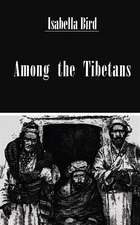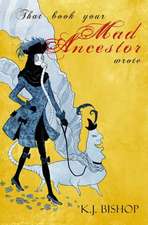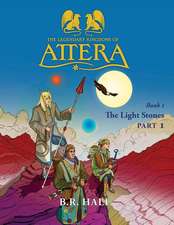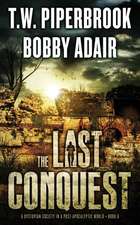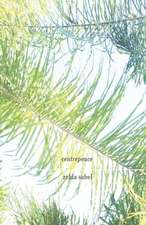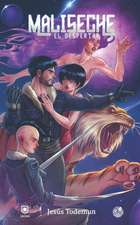The Etched City
Autor Kristen Bishop, K. J. Bishop, Bishopen Limba Engleză Paperback – 31 oct 2004
Gwynn and Raule are rebels on the run, with little in common except being on the losing side of a hard-fought war. Gwynn is a gunslinger from the north, a loner, a survivor . . . a killer. Raule is a wandering surgeon, a healer who still believes in just-and lost-causes. Bound by a desire to escape the ghosts of the past, together they flee to the teeming city of Ashamoil, where Raule plies her trade among the desperate and destitute, and Gwynn becomes bodyguard and assassin for the household of a corrupt magnate. There, in the saving and taking of lives, they find themselves immersed in a world where art infects life, dream and waking fuse, and splendid and frightening miracles begin to bloom . . .
"The plot, with its stories-within-stories and its offhand descriptions of wonders and prodigies, brings to mind the works of Italo Calvino and Jorge Luis Borges."-Locus
Preț: 139.05 lei
Nou
Puncte Express: 209
Preț estimativ în valută:
26.62€ • 28.92$ • 22.37£
26.62€ • 28.92$ • 22.37£
Carte disponibilă
Livrare economică 31 martie-14 aprilie
Preluare comenzi: 021 569.72.76
Specificații
ISBN-13: 9780553382914
ISBN-10: 0553382918
Pagini: 382
Dimensiuni: 137 x 213 x 25 mm
Greutate: 0.5 kg
Ediția:Bantam Trade Pb.
Editura: Spectra Books
ISBN-10: 0553382918
Pagini: 382
Dimensiuni: 137 x 213 x 25 mm
Greutate: 0.5 kg
Ediția:Bantam Trade Pb.
Editura: Spectra Books
Notă biografică
K.J. Bishop was born in Melbourne, Australia. Her short stories have been published in Aurealis, Fables and Reflections, Borderlands, Album Zutique #1, Leviathan 4, The Alsiso Project, The Thackery T. Lambshead Pocket Guide to Eccentric and Discredited Diseases, and the Serbian magazines Polaris and Znack Sagite. The Etched City is her first novel.
Extras
1
There were no milestones in the Copper Country. Often a traveller could only measure the progress of a journey by the time it took to get from each spoiled or broken thing to the next: a half day's walk from a dry well to the muzzle of a cannon poking out of a sand slope, two hours to reach the skeletons of a man and a mule. The land was losing its battle with time. Ancient and exhausted, it visited decrepitude on everything within its bounds, as though out of spleen.
In the south of the country, arid scrubby plains alternated with stretches of desert. One road crossed this region, connecting the infrequent hamlets and oases, following the line of a derelict stone wall built long ago by a warlord. Along it, at distant intervals, were the remains of watchtowers and small forts. The greater part of the wall and its fortifications lay in complete ruin, but occasional sections remained intact enough to provide shelter.
One evening, late in the Husk Month, as the sun was getting on towards the horizon and the bite was at last starting to go out of its rays, the road brought the physician Raule to a tower with three standing walls. At this promising sight her dark features lifted out of the scowl they had settled into during the stifling, monotonous afternoon. Earlier that day, she had traded tales with the Harutaim nomads whose way took them along the road, or rather beside it, for they held man-made paths in low esteem. They never camped near the wall, and had cautioned Raule not to do so either. They believed the ruins were haunted by evil spirits, the ancient and acrimonious undead. But Raule preferred the stone places to the empty land outside.
Inside the tower she found the ashes of someone else's campfire, a bottle, an empty meat can, and a wad of blood-soiled bandages. She alighted from her camel and left it to graze on some thorny plants that had taken root in the gravel around the stonework. After kicking the rubbish into a corner, she pitched her small tent against a wall, and built a fire on the remains of the litterer's. She ate, chewing down some strips of dried goat meat she had bought from the Harutaim. With more relish, she devoured a handful of dates, spearing them on the point of an old knife and cooking them over the flames until they were hot and soft. Her small meal finished, she stayed seated in front of the fire, wrapped in a blanket and her thoughts, tired but unable to sleep, as night came on.
The temperature dropped sharply after the sun set, and a fierce wind blew up and went hooting back and forth across the sky. As Raule listened to it she thought it might be easy to imagine djinns and ghouls out in the darkness, or to fancy that you heard the camel bells of a phantom caravan passing along the road.
When she slept at last she had dreams about the dead. These days, she saw them whenever she closed her eyes.
The wall ended at the town of Proof Rock. The sun was a late-afternoon bonfire, the earth overcooked and flyblown. Raule slouched in her saddle. Sweat glued her shirt and breeches to her skin, and her feet were baking inside her boots. She looked around without excitement.
Like most settlements in the Copper Country, Proof Rock was seemingly assembled from the detritus of other, defunct habitations. The only visible souls were a few old men and women, dozing on porches and balconies, as still as pegs of wood. Closed doors and shuttered windows completed the picture of an empty nest.
At the edge of the town there was an inn built of motley scrap metal. It had a brick porch, shaded by a tarpaulin and a mangy palm tree. A blanket slung over a wire served as the door, while sacking covered the windows, concealing the interior. Four camels were tethered to a rail in front of the porch. Raule appraised them. They were fit-looking mounts, handsomely caparisoned, but conspicuously lacking bells.
Raule dismounted, tied her camel to the palm tree, and went up to the doorway. She carried the medicine satchel that advertised her peaceable trade, while keeping her right hand near the scattergun she had made by sawing a shotgun short of most of its barrel.
She pushed the blanket back. Inside there was gloom, a sawdust floor, and buzzing flies. The air was searing, almost unbreathably hot. The temperature outdoors felt pleasant in comparison. The only customers were four men sitting at cards around a table crowded with bottles, glasses, and piles of banknotes. All four were clad in sombre-coloured outfits, decked out with weapons and ammunition bandoliers, and wore wide-brimmed hats that hid their features in shadow. Spectres of trouble. They all turned and looked at Raule.
One of them, a slim man, was fully muffled in a black domino, with a dustveil over his lower face. Raule smiled inwardly at such a graphic caricature of a ne'er-do-well. Then a sword hanging at his left hip, with its point resting behind him on the floor, caught her eye. The long, slightly curved scabbard was familiar to her.
The man tugged the brim of his hat down, as though he was wary of her eyes. But then his fingers, clad in black gloves, drummed on the table in apparently idle fashion, and Raule read their movement:
Nice to see you. Wait till later.
The other three gave her looks that plainly said "later" as well, but with different intent. She was unconcerned about that; later they'd be dead drunk.
Excepting the ghosts in her dreams, Raule hadn't seen a face she knew, either friend or foe, for more than half a year. Though she thought about leaving then and there, life had been too lonely lately, and so she chose to stay. Wanting a drink, and water to wash with if any was to be had, she walked to the bar. No one was there. Her nose picked up a raw smell.
Looking over the counter, she saw the body of an elderly man, who was no doubt the innkeeper. Something sharp and heavy had broken his skull open like an egg. The blood around him was still wet. A shelf behind the bar held a few bottles, but Raule decided to forgo alcoholic refreshment for the time being. There was a gap between two sheets of tin in the back wall, with another room visible beyond. Without looking at the men again, Raule moved towards the gap.
"Woman, stop."
It wasn't the voice of her acquaintance at the table. It was of iron and clinker. Raule halted.
"How would you say that man died?" the voice drawled.
"I would say," Raule answered, not facing around, "that he fell and hit his head."
There was ugly laughter, briefly. Then the shuffle and snap of cards signalled the resumption of play.
Just teasing.
Raule went through the opening and found herself in a bedroom-cum-storeroom. The shelves held a few sacks of beans and some hoary sausages. On the floor lay a strongbox, broken open and empty. An unlikely leadlight door of yellow-and-green glass roundels led out to an open yard. Raule squinted in the sudden light. In a corner of the yard there was a pump with a bucket beside it. She tried the pump, which yielded brown water. She cupped some in her hands and splashed it on her head and neck. A muddy residue stayed in the lines on her palms. She wasn't going to try drinking it, but in case the camel was thirsty she filled the bucket and walked back around the side of the building. The camel drank a few mouthfuls, then gave the bucket a disdainful kick, spilling the water, which the dry ground rapidly swallowed.
Raule drank from one of the several canteens she carried, then settled under the palm tree and let her eyes close. However, she kept her ears open.
The sun inched down the sky. Shadows lengthened. An emaciated, three-legged hound limped across the road. Brass-coloured ants that were half as long as Raule's thumb came crawling out of a hole in front of her feet. She kept count of them.
Nine hundred and thirteen ants later, gunfire erupted indoors.
Even though Raule had been half-expecting it, the sudden earsplitting noise gave her a jolt. She jumped off the porch and lay flat. She heard several pistols being rapidly emptied and men bellowing like bulls.
Then all went quiet again.
Raule crept to the doorway. Squatting, she lifted the bottom edge of the blanket a little and peered into the room. Dark figures lay prone on the floor amid overturned chairs and broken glass. Only the veiled man was standing, wreathed in gunsmoke, lit by a cat's cradle of thin sunbeams threading through new bullet holes in the walls and roof. He reloaded the pair of long-barrelled revolvers he had in hand and holstered them. Then from the curved scabbard he drew a yataghan sword and swung it down three times, severing each fallen man's head. That had always been his preferred way of making sure of a kill. Raule thought it was something of a comforting habit, too, like some people's habits of straightening crooked-hanging pictures, or always wearing a certain item of clothing.
She got to her feet. As she went to move the blanket, the wire fell down. The man started, and brought the sword up. Seeing only Raule there, he lowered it again.
Raule stepped inside and took a few paces into the smoke, stopping several feet short of the man and the mire of sawdust and blood he stood in. She glanced down at the bodies. "Who was cheating?"
"Who do you think?" The voice from behind the dustveil was pleasant, with the slight breathy timbre of a northern accent.
"It seems you've still got your sweet touch, Gwynn."
"You use it or lose it," he said dispassionately. He wiped the sword on the nearest corpse's sleeve, then sheathed it. He removed his hat, then the domino and the veil, disclosing foreign features: a white, finely tapered face, graced by an expression of urbane serenity. His eyes were waterish green, as though they held brine. His hair was black, long, braided in a queue. "It's good to see you, Raule," he said. Locating an unbroken bottle and glass on the table, he poured himself a drink. "One for yourself?"
"Maybe later."
When he had quenched his thirst, he stepped over the bodies and held out his hand, smiling. With that smile the strange peace in his looks dissolved, and a baneful quiddity showed itself.
Raule had a moment of hesitation. There were other people she would have preferred to meet. But Gwynn had once been a comrade, and in some ways one of her better friends. She didn't have so many of those left that she could afford to be choosy. She took his grip.
"I had thought you must be decorating a gallows by now," she said. Their old foe, General Anforth and his Army of Heroes, liked leaving enemies alive no more than Gwynn did.
He cocked an eyebrow. "I? A jig was never my favourite dance, you know."
Raule heard less bravado than self-mockery in his words. Having become famous, or at least infamous, Gwynn had always professed amusement at the disparity between the grandeur that myth demanded of a famous man's life and death, and the bathos and indignities that actual circumstances tended to force upon both.
"Is Anforth still after you? I can't imagine he's given up," said Raule.
"Oh, he never will. The old bulldog pursues me as ardently as ever. He's made me worth a fortune. If only one could buy shares in oneself, I could be a rich man. You must have been keeping well to the backblocks if you haven't seen my face on a reward notice lately."
"I'm afraid I've dropped out of the social circuit."
The unpleasant smile crossed Gwynn's face again. "I've heard all the parties are deserted this year. Even people of quality only want to hobnob with the lynch mob of an evening. I take it you're doctoring in this territory?"
"Around and about. There's enough work."
"Of the paying kind?"
"No, not really."
In fact, Raule was close to destitution. Few of the people she treated had the means to pay for her services with anything more than a night's shelter and a frugal meal. When they did manage to scrape up a little money, she couldn't always bring herself to take it. Not wanting to dwell on the subject of her poverty, she asked Gwynn whether he had news of anyone else.
"I saw Casvar at Flat Mountain," he answered. "He was rotting in a cave, with gangrene in a broken leg. He asked me to do the decent thing, and I obliged him. In Quanut I saw a grave with Red Harni's name on the marker. Have you seen anyone?"
"Evoiry, a few months back. He was selling firewood at a souk. He looked all right."
Gwynn nodded. His left hand fingered the hilt of his sword. Raule's eyes went to it. Gwynn had brought it with him from the north. It was of Maghian manufacture and its true name was Heron's Wing Scythes Over A Mountain Lake, but Gwynn had given it another name in his native Anvallic: Gol'achab, meaning Not My Funeral.
Raule noticed that the gemstones that had decorated the hilt were no longer there. Gwynn saw her looking. "I traded all that rock candy for a few necessities a while ago," he volunteered. "She may have lost her beauty, but she still works, and she saves me bullets from time to time."
Raule glanced in the direction of the late innkeeper. "Was that one?"
"No." Gwynn stepped back and nudged one of the bodies with the toe of his boot. "This fellow took exception to something the man said, and was somewhat overenthusiastic in his response." Looking down at the corpse, he shook his head. "Poor bastard. His nerves were wound up like piano wires. I never saw him look happy. Life must have been a burden to him."
"They all must have been pretty high-strung, to get in a four-way firefight over cards," Raule commented.
"I daresay."
"What are your plans, then?"
Gwynn walked past her. "Sleep. I want to leave at nightfall." He disappeared outside, and returned carrying a knapsack. He took off his gloves and rolled up his shirtsleeves, and began stripping the corpses and gathering up what money had escaped drowning in the blood on the floor. Raule left him to it and went out into the comparatively fresh air. She squatted on her heels under the palm tree, surveying the street, where the old-timers slumbered on. I know how they feel, she thought.
There were no milestones in the Copper Country. Often a traveller could only measure the progress of a journey by the time it took to get from each spoiled or broken thing to the next: a half day's walk from a dry well to the muzzle of a cannon poking out of a sand slope, two hours to reach the skeletons of a man and a mule. The land was losing its battle with time. Ancient and exhausted, it visited decrepitude on everything within its bounds, as though out of spleen.
In the south of the country, arid scrubby plains alternated with stretches of desert. One road crossed this region, connecting the infrequent hamlets and oases, following the line of a derelict stone wall built long ago by a warlord. Along it, at distant intervals, were the remains of watchtowers and small forts. The greater part of the wall and its fortifications lay in complete ruin, but occasional sections remained intact enough to provide shelter.
One evening, late in the Husk Month, as the sun was getting on towards the horizon and the bite was at last starting to go out of its rays, the road brought the physician Raule to a tower with three standing walls. At this promising sight her dark features lifted out of the scowl they had settled into during the stifling, monotonous afternoon. Earlier that day, she had traded tales with the Harutaim nomads whose way took them along the road, or rather beside it, for they held man-made paths in low esteem. They never camped near the wall, and had cautioned Raule not to do so either. They believed the ruins were haunted by evil spirits, the ancient and acrimonious undead. But Raule preferred the stone places to the empty land outside.
Inside the tower she found the ashes of someone else's campfire, a bottle, an empty meat can, and a wad of blood-soiled bandages. She alighted from her camel and left it to graze on some thorny plants that had taken root in the gravel around the stonework. After kicking the rubbish into a corner, she pitched her small tent against a wall, and built a fire on the remains of the litterer's. She ate, chewing down some strips of dried goat meat she had bought from the Harutaim. With more relish, she devoured a handful of dates, spearing them on the point of an old knife and cooking them over the flames until they were hot and soft. Her small meal finished, she stayed seated in front of the fire, wrapped in a blanket and her thoughts, tired but unable to sleep, as night came on.
The temperature dropped sharply after the sun set, and a fierce wind blew up and went hooting back and forth across the sky. As Raule listened to it she thought it might be easy to imagine djinns and ghouls out in the darkness, or to fancy that you heard the camel bells of a phantom caravan passing along the road.
When she slept at last she had dreams about the dead. These days, she saw them whenever she closed her eyes.
The wall ended at the town of Proof Rock. The sun was a late-afternoon bonfire, the earth overcooked and flyblown. Raule slouched in her saddle. Sweat glued her shirt and breeches to her skin, and her feet were baking inside her boots. She looked around without excitement.
Like most settlements in the Copper Country, Proof Rock was seemingly assembled from the detritus of other, defunct habitations. The only visible souls were a few old men and women, dozing on porches and balconies, as still as pegs of wood. Closed doors and shuttered windows completed the picture of an empty nest.
At the edge of the town there was an inn built of motley scrap metal. It had a brick porch, shaded by a tarpaulin and a mangy palm tree. A blanket slung over a wire served as the door, while sacking covered the windows, concealing the interior. Four camels were tethered to a rail in front of the porch. Raule appraised them. They were fit-looking mounts, handsomely caparisoned, but conspicuously lacking bells.
Raule dismounted, tied her camel to the palm tree, and went up to the doorway. She carried the medicine satchel that advertised her peaceable trade, while keeping her right hand near the scattergun she had made by sawing a shotgun short of most of its barrel.
She pushed the blanket back. Inside there was gloom, a sawdust floor, and buzzing flies. The air was searing, almost unbreathably hot. The temperature outdoors felt pleasant in comparison. The only customers were four men sitting at cards around a table crowded with bottles, glasses, and piles of banknotes. All four were clad in sombre-coloured outfits, decked out with weapons and ammunition bandoliers, and wore wide-brimmed hats that hid their features in shadow. Spectres of trouble. They all turned and looked at Raule.
One of them, a slim man, was fully muffled in a black domino, with a dustveil over his lower face. Raule smiled inwardly at such a graphic caricature of a ne'er-do-well. Then a sword hanging at his left hip, with its point resting behind him on the floor, caught her eye. The long, slightly curved scabbard was familiar to her.
The man tugged the brim of his hat down, as though he was wary of her eyes. But then his fingers, clad in black gloves, drummed on the table in apparently idle fashion, and Raule read their movement:
Nice to see you. Wait till later.
The other three gave her looks that plainly said "later" as well, but with different intent. She was unconcerned about that; later they'd be dead drunk.
Excepting the ghosts in her dreams, Raule hadn't seen a face she knew, either friend or foe, for more than half a year. Though she thought about leaving then and there, life had been too lonely lately, and so she chose to stay. Wanting a drink, and water to wash with if any was to be had, she walked to the bar. No one was there. Her nose picked up a raw smell.
Looking over the counter, she saw the body of an elderly man, who was no doubt the innkeeper. Something sharp and heavy had broken his skull open like an egg. The blood around him was still wet. A shelf behind the bar held a few bottles, but Raule decided to forgo alcoholic refreshment for the time being. There was a gap between two sheets of tin in the back wall, with another room visible beyond. Without looking at the men again, Raule moved towards the gap.
"Woman, stop."
It wasn't the voice of her acquaintance at the table. It was of iron and clinker. Raule halted.
"How would you say that man died?" the voice drawled.
"I would say," Raule answered, not facing around, "that he fell and hit his head."
There was ugly laughter, briefly. Then the shuffle and snap of cards signalled the resumption of play.
Just teasing.
Raule went through the opening and found herself in a bedroom-cum-storeroom. The shelves held a few sacks of beans and some hoary sausages. On the floor lay a strongbox, broken open and empty. An unlikely leadlight door of yellow-and-green glass roundels led out to an open yard. Raule squinted in the sudden light. In a corner of the yard there was a pump with a bucket beside it. She tried the pump, which yielded brown water. She cupped some in her hands and splashed it on her head and neck. A muddy residue stayed in the lines on her palms. She wasn't going to try drinking it, but in case the camel was thirsty she filled the bucket and walked back around the side of the building. The camel drank a few mouthfuls, then gave the bucket a disdainful kick, spilling the water, which the dry ground rapidly swallowed.
Raule drank from one of the several canteens she carried, then settled under the palm tree and let her eyes close. However, she kept her ears open.
The sun inched down the sky. Shadows lengthened. An emaciated, three-legged hound limped across the road. Brass-coloured ants that were half as long as Raule's thumb came crawling out of a hole in front of her feet. She kept count of them.
Nine hundred and thirteen ants later, gunfire erupted indoors.
Even though Raule had been half-expecting it, the sudden earsplitting noise gave her a jolt. She jumped off the porch and lay flat. She heard several pistols being rapidly emptied and men bellowing like bulls.
Then all went quiet again.
Raule crept to the doorway. Squatting, she lifted the bottom edge of the blanket a little and peered into the room. Dark figures lay prone on the floor amid overturned chairs and broken glass. Only the veiled man was standing, wreathed in gunsmoke, lit by a cat's cradle of thin sunbeams threading through new bullet holes in the walls and roof. He reloaded the pair of long-barrelled revolvers he had in hand and holstered them. Then from the curved scabbard he drew a yataghan sword and swung it down three times, severing each fallen man's head. That had always been his preferred way of making sure of a kill. Raule thought it was something of a comforting habit, too, like some people's habits of straightening crooked-hanging pictures, or always wearing a certain item of clothing.
She got to her feet. As she went to move the blanket, the wire fell down. The man started, and brought the sword up. Seeing only Raule there, he lowered it again.
Raule stepped inside and took a few paces into the smoke, stopping several feet short of the man and the mire of sawdust and blood he stood in. She glanced down at the bodies. "Who was cheating?"
"Who do you think?" The voice from behind the dustveil was pleasant, with the slight breathy timbre of a northern accent.
"It seems you've still got your sweet touch, Gwynn."
"You use it or lose it," he said dispassionately. He wiped the sword on the nearest corpse's sleeve, then sheathed it. He removed his hat, then the domino and the veil, disclosing foreign features: a white, finely tapered face, graced by an expression of urbane serenity. His eyes were waterish green, as though they held brine. His hair was black, long, braided in a queue. "It's good to see you, Raule," he said. Locating an unbroken bottle and glass on the table, he poured himself a drink. "One for yourself?"
"Maybe later."
When he had quenched his thirst, he stepped over the bodies and held out his hand, smiling. With that smile the strange peace in his looks dissolved, and a baneful quiddity showed itself.
Raule had a moment of hesitation. There were other people she would have preferred to meet. But Gwynn had once been a comrade, and in some ways one of her better friends. She didn't have so many of those left that she could afford to be choosy. She took his grip.
"I had thought you must be decorating a gallows by now," she said. Their old foe, General Anforth and his Army of Heroes, liked leaving enemies alive no more than Gwynn did.
He cocked an eyebrow. "I? A jig was never my favourite dance, you know."
Raule heard less bravado than self-mockery in his words. Having become famous, or at least infamous, Gwynn had always professed amusement at the disparity between the grandeur that myth demanded of a famous man's life and death, and the bathos and indignities that actual circumstances tended to force upon both.
"Is Anforth still after you? I can't imagine he's given up," said Raule.
"Oh, he never will. The old bulldog pursues me as ardently as ever. He's made me worth a fortune. If only one could buy shares in oneself, I could be a rich man. You must have been keeping well to the backblocks if you haven't seen my face on a reward notice lately."
"I'm afraid I've dropped out of the social circuit."
The unpleasant smile crossed Gwynn's face again. "I've heard all the parties are deserted this year. Even people of quality only want to hobnob with the lynch mob of an evening. I take it you're doctoring in this territory?"
"Around and about. There's enough work."
"Of the paying kind?"
"No, not really."
In fact, Raule was close to destitution. Few of the people she treated had the means to pay for her services with anything more than a night's shelter and a frugal meal. When they did manage to scrape up a little money, she couldn't always bring herself to take it. Not wanting to dwell on the subject of her poverty, she asked Gwynn whether he had news of anyone else.
"I saw Casvar at Flat Mountain," he answered. "He was rotting in a cave, with gangrene in a broken leg. He asked me to do the decent thing, and I obliged him. In Quanut I saw a grave with Red Harni's name on the marker. Have you seen anyone?"
"Evoiry, a few months back. He was selling firewood at a souk. He looked all right."
Gwynn nodded. His left hand fingered the hilt of his sword. Raule's eyes went to it. Gwynn had brought it with him from the north. It was of Maghian manufacture and its true name was Heron's Wing Scythes Over A Mountain Lake, but Gwynn had given it another name in his native Anvallic: Gol'achab, meaning Not My Funeral.
Raule noticed that the gemstones that had decorated the hilt were no longer there. Gwynn saw her looking. "I traded all that rock candy for a few necessities a while ago," he volunteered. "She may have lost her beauty, but she still works, and she saves me bullets from time to time."
Raule glanced in the direction of the late innkeeper. "Was that one?"
"No." Gwynn stepped back and nudged one of the bodies with the toe of his boot. "This fellow took exception to something the man said, and was somewhat overenthusiastic in his response." Looking down at the corpse, he shook his head. "Poor bastard. His nerves were wound up like piano wires. I never saw him look happy. Life must have been a burden to him."
"They all must have been pretty high-strung, to get in a four-way firefight over cards," Raule commented.
"I daresay."
"What are your plans, then?"
Gwynn walked past her. "Sleep. I want to leave at nightfall." He disappeared outside, and returned carrying a knapsack. He took off his gloves and rolled up his shirtsleeves, and began stripping the corpses and gathering up what money had escaped drowning in the blood on the floor. Raule left him to it and went out into the comparatively fresh air. She squatted on her heels under the palm tree, surveying the street, where the old-timers slumbered on. I know how they feel, she thought.
Descriere
Fleeing the ghosts of their past, a healer and a killer escape from the ruined Copper Country to the city of Ashamoil. But as they salvage new lives, they will discover that the ghosts of the past are also the ghosts of the future.

